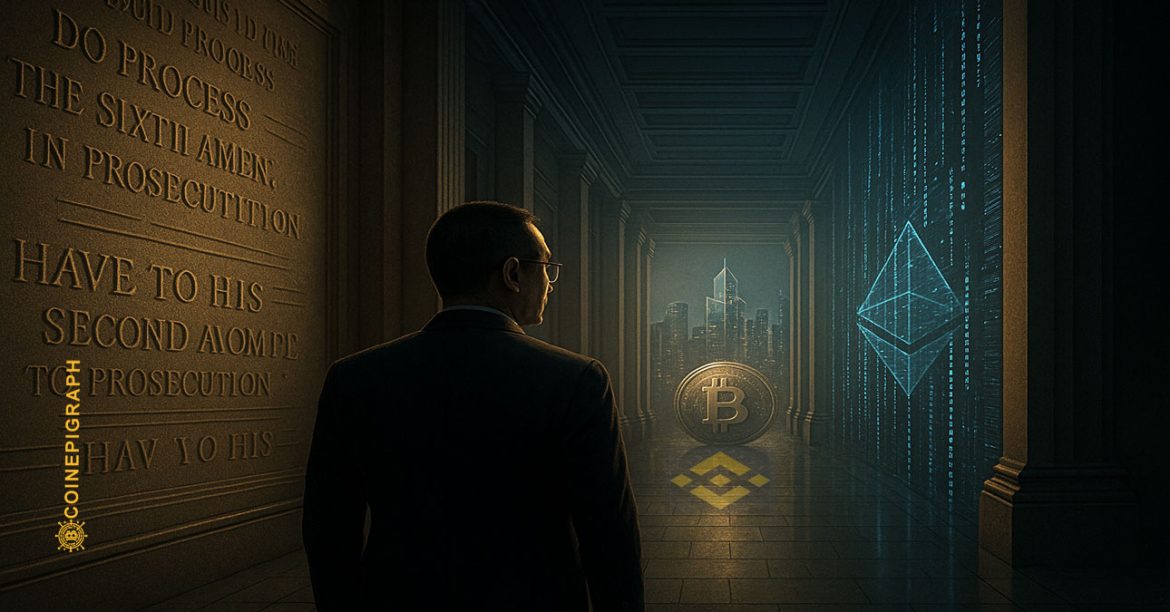By CoinEpigraph Editorial Desk
Changpeng “CZ” Zhao, the founder of Binance, may be preparing to take legal action against a U.S. senator after she publicly characterized his past legal case as a money-laundering conviction — a description his team calls inaccurate and defamatory.
According to reports from several media outlets, Zhao’s legal advisors are reviewing whether statements made by Senator Elizabeth Warren misrepresented the nature of his plea agreement with the U.S. Department of Justice. While CZ did plead guilty in 2023 to violating the Bank Secrecy Act by failing to maintain an adequate anti-money-laundering (AML) program, he was not charged or convicted of laundering money.
For Zhao, the difference is not semantic — it’s reputational.
The Origin of the Dispute
During a recent policy discussion on digital-asset risks, Senator Warren reportedly cited CZ’s case as “a textbook example of a money-laundering conviction.” The comment drew quick criticism from legal observers who noted that the Department of Justice never accused Zhao personally of laundering funds. Instead, prosecutors focused on compliance failures within Binance’s operations, which resulted in a $4.3 billion corporate settlement and Zhao’s resignation as CEO.
Zhao later issued a short statement online, reaffirming that the charge was limited to an AML compliance breach and emphasizing that he had accepted responsibility in order to close a complex, years-long investigation.
Behind the scenes, sources close to Binance’s legal team told regional outlets that they are considering civil defamation proceedings to correct what they describe as “material mischaracterizations” of the case. No formal complaint has yet been filed.
Reputation Versus Regulation
In an industry already battling perception risk, words matter. A label such as “money-laundering conviction” can carry consequences far beyond headlines — influencing banking relationships, licensing prospects, and the broader narrative around crypto leadership credibility.
For Zhao, whose global influence made Binance a dominant exchange before his legal troubles, restoring precision around the record may be part of a longer-term strategy to re-enter financial markets as an investor or builder once his restrictions expire.
More broadly, the situation highlights how political language has begun to shape crypto’s legal reality. In the U.S., the conversation around digital-asset regulation has drifted from technical compliance to moral framing — a shift that often blurs lines between corporate misconduct and criminal intent.
Legal Perspective
Defamation cases involving public officials and public figures face high bars in U.S. law. Under the Supreme Court’s New York Times v. Sullivan standard, Zhao would need to prove that the senator’s statement was not only false but made with “actual malice” — knowledge of falsity or reckless disregard for the truth.
That is difficult terrain. Yet even the threat of such action can serve a purpose: compelling clarification or retraction that corrects the public record. Several attorneys contacted by international outlets said that if Zhao’s team proceeds, it would signal “a new assertiveness” among crypto executives seeking to defend professional credibility against political generalization.
Context: From Enforcement to Narrative
Zhao’s legal chapter concluded with one of the largest settlements in crypto history. In addition to fines, Binance agreed to a multi-year compliance overhaul and independent monitoring. Zhao himself received a four-month prison sentence, a term he served earlier this year.
Since his release, he has maintained a low profile, focusing on philanthropy and education projects under the Giggle Academy initiative, while avoiding commentary on Binance’s ongoing operations.
That restraint makes the current pushback notable. It suggests a recognition that the political narrative around crypto regulation is increasingly reputational rather than legal. A misstatement from a policymaker can travel further, faster, and with more economic consequence than an enforcement filing.
The Policy Undercurrent
The controversy also reflects the deep polarization around crypto policy in Washington. Senator Warren has been one of the most vocal critics of the digital-asset industry, advocating for tighter AML and consumer-protection rules. Her office has introduced several bills designed to extend Bank Secrecy Act obligations to wallet providers, miners, and validators — measures the industry argues would be technically unworkable and economically stifling.
Against that backdrop, CZ’s prospective lawsuit is less about a personal dispute and more about drawing boundaries between regulatory accountability and political overreach. It raises a question that transcends the personalities involved: at what point does aggressive rhetoric against crypto become misinformation?
Implications for the Industry
If Zhao’s team moves forward, it could mark the first major instance of a crypto executive challenging a sitting U.S. senator over factual accuracy — an unprecedented step in the sector’s history.
Even if no filing occurs, the episode may prompt lawmakers and regulators to exercise greater precision when referencing enforcement cases, especially in an election-charged environment where crypto has become both a policy wedge and a campaign talking point.
For now, Zhao’s representatives have emphasized that their focus remains on accuracy, not politics. The message is consistent with a broader industry desire: to separate legal compliance from the caricature of criminality that often shadows the space.
In the post-settlement era, it seems, the next battle for crypto’s legitimacy may not be fought in courtrooms or committee hearings — but in the vocabulary that defines both.
At CoinEpigraph, we are committed to delivering digital-asset journalism with clarity, accuracy, and uncompromising integrity. Our editorial team works daily to provide readers with reliable, insight-driven coverage across an ever-shifting crypto and macro-financial landscape. As we continue to broaden our reporting and introduce new sections and in-depth op-eds, our mission remains unchanged: to be your trusted, authoritative source for the world of crypto and emerging finance.
— Ian Mayzberg, Editor-in-Chief
The team at CoinEpigraph.com is committed to independent analysis and a clear view of the evolving digital asset order.
To help sustain our work and editorial independence, we would appreciate your support of any amount of the tokens listed below. Support independent journalism:
BTC: 3NM7AAdxxaJ7jUhZ2nyfgcheWkrquvCzRm
SOL: HxeMhsyDvdv9dqEoBPpFtR46iVfbjrAicBDDjtEvJp7n
ETH: 0x3ab8bdce82439a73ca808a160ef94623275b5c0a
XRP: rLHzPsX6oXkzU2qL12kHCH8G8cnZv1rBJh TAG – 1068637374
SUI – 0xb21b61330caaa90dedc68b866c48abbf5c61b84644c45beea6a424b54f162d0c
and through our Support Page.
🔍 Disclaimer: CoinEpigraph is for entertainment and information, not investment advice. Markets are volatile — always conduct your own research.
COINEPIGRAPH™ does not offer investment advice. Always conduct thorough research before making any market decisions regarding cryptocurrency or other asset classes. Past performance is not a reliable indicator of future outcomes. All rights reserved | 版权所有 ™ © 2024-2029.





